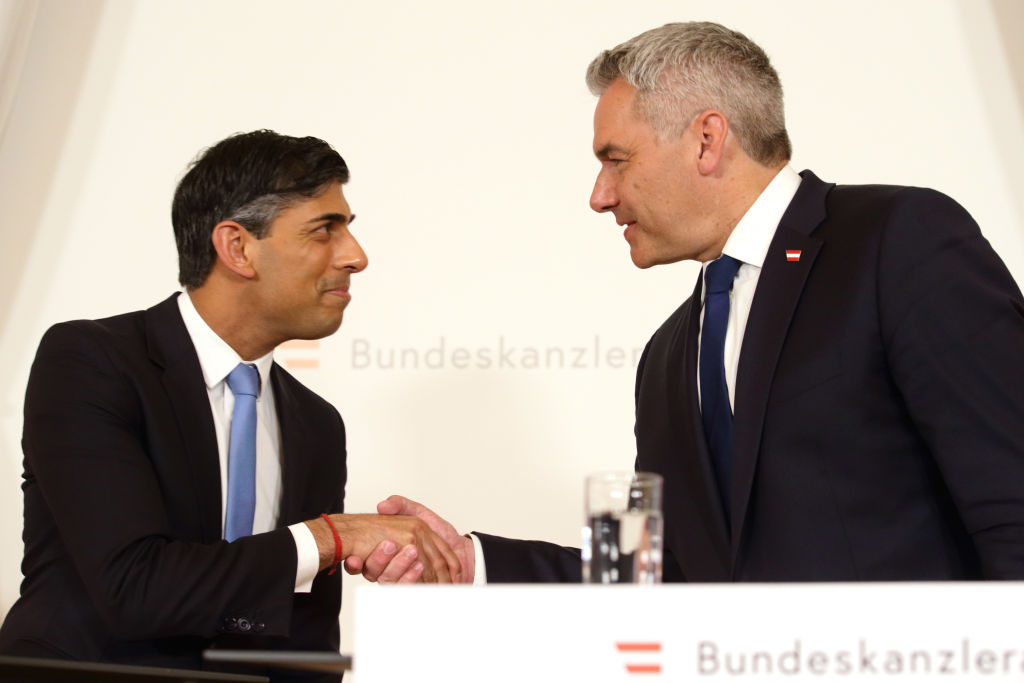Opponents of the UK’s Rwanda scheme cast it as a “national obscenity”, decrying “the horror of what we are now”. Yet, unexpectedly for some, the plan is finding international support. EU countries feeling the effects of mass illegal immigration are looking on with growing admiration at the UK’s approach.
Austrian Chancellor Karl Nehammer endorsed the Rwanda plan in a meeting with Rishi Sunak yesterday, saying that carrying out asylum procedures in safe third countries would “save human lives” by striking a blow against people smugglers. Nehammer called for similar deals to be “put on the EU’s agenda”, describing the UK as a “pioneer” of this new approach.
Sunak, in turn, praised Austria for being “right on this issue for a long time”. Last week, Austria’s Interior Minister Gerhard Karner claimed the country’s tough stance, with increased border controls and expedited asylum claim processes, has led to an overall decrease in the number of illegal immigrants entering the country. A situation in which “the majority of those arriving were single men” has finally been stopped, he added.
This isn’t the first time that the Rwanda plan has won admiration from within the EU. Last year, Hungary’s then-Justice Minister Judit Varga commended the Tories’ “brave” decision to “think outside the box”, while Denmark has toyed with the possibility of a similar scheme of its own. The European Commission has been critical of these countries’ individual measures to tackle illegal immigration, however, and it has long seemed that any appetite for an EU-wide Rwanda-style deal would be unable to overcome opposition in Brussels.
Yet this could change after European Parliament elections in early June. A Right-wing surge is predicted, with migration a key issue in campaigning. Discontent with current EU migration policy is persistent despite the European Parliament passing a vaunted new Migration Pact in April. A letter made public last week, signed by 15 countries including Austria, calls for an “outsourcing” of migration policy, urging the EU to switch focus “from managing irregular migration in Europe to supporting refugees as well as host communities in regions of origin”.
The implicit recognition — the same recognition which underpins the UK’s Rwanda deal — is that raising the prospect of illegal immigrants ending up in countries where they do not want to go may be the only way to cut off migration flows to places where they do want to go. The EU’s longtime preoccupation with internal redistribution of asylum seekers, on the other hand, fails to tackle the root cause of these illegal immigration flows.
This interpretation is slowly influencing EU decision-makers spooked by the Right-wing poll shift. European Commission President Ursula von der Leyen has struck deals with North African states, providing EU money in exchange for assistance in stemming migrant flows. This month, it was claimed that EU funds have been used to pay units involved in brutal migrant “desert dumps” in Morocco, Mauritania and Tunisia.
If EU elections go as expected, calls for a further strengthening of the bloc’s migration policy will be inevitable, and Austria’s wish for a Rwanda-style deal to be put on the EU agenda will become realistic — especially with Hungary assuming the EU’s rotating presidency in July. Brexit has, in more ways than one, allowed Britain to “think outside the box” on this issue, and if a Right-wing swing in the EU does materialise, the Rwanda precedent may set the stage for a new phase of the continent’s migration debate.










Join the discussion
Join like minded readers that support our journalism by becoming a paid subscriber
To join the discussion in the comments, become a paid subscriber.
Join like minded readers that support our journalism, read unlimited articles and enjoy other subscriber-only benefits.
Subscribe